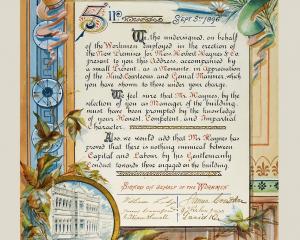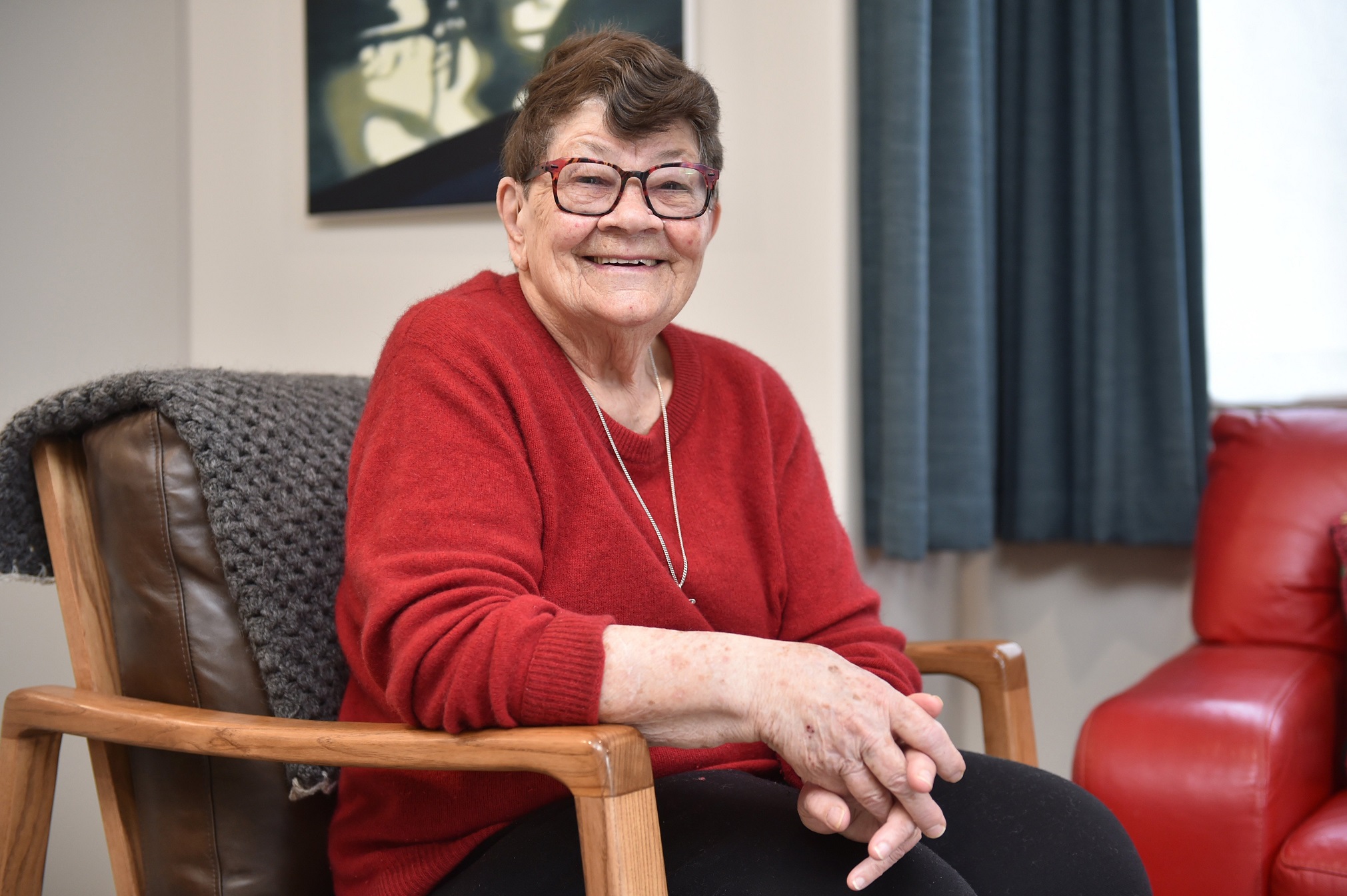
Ant had a sunhat with a flat yellow brim.
Bee said, "Flower!" and sat on him.
Dame Joy Cowley sits in the lounge of her compact, modern townhouse; one of dozens in a retirement village bounded by an intermediate school and a marae, at the north end of Dunedin’s Kaikorai Valley.
On a table to her right, a magnifying glass lies on a typewritten sheet filled with 64-point font; over her shoulder, atop the breakfast bar, a porcelain Jesus stands, arms out wide; and on the red leather sofa next to her rests the burnt-orange cover of her latest book, A Lot of Silly: A Book of Rhymes and Nonsense.
The book’s opening salvo is a poem about a man wearing an upside-down hat. Why? Because he is taking tadpoles for a walk.
Over the page, sunny-looking lemons make lips go funny and an ant’s bright hat is mistaken for a bee’s landing pad.
Vantage point and view. Understandings altered by pivoting perspectives. Echoes of Dame Joy’s 88 years.
Dame Joy is one of New Zealand’s most accomplished writers of books for the past three generations of children. Among awards and honours for her best-sellers are the 2010 Prime Minister’s Award for contribution to literature and the 2020 New Zealand Arts Foundation Icon Award. Including the Mrs Wishy-Washy series, she has sold more than 40 million copies of her books worldwide, in English, Māori and more than two dozen other languages.
Less well-known is a deliberate drug-overdose that changed her life as a young woman, her work as a spiritual director in recent years and the fact Dame Joy, who made Dunedin her home in April, continues to write despite having lost most of her sight.
"I would have thought [of] my life as going into different chapters. Now, looking back, I see everything that has happened as fluid," she says.
"It’s the difference between being a teenager seeing the world in terms of good and evil and now looking at it in terms of blessing and teaching. It’s the hard stuff that is the teacher; and eventually it becomes the most valuable."
Cassia Joy Cowley (nee Summers) was born in 1936, in Levin, to a father unable to work after two bouts of rheumatic fever and a mother later diagnosed with schizophrenia.
Even as a child, she was entertaining her four siblings with stories.
This creativity was further cultivated at Palmerston North Girls’ High School, where she was encouraged to pursue writing and art.
"There’s nothing more wonderful for a kid from a very poor family than to get a prize for what she can do."
Her parents wanted her to leave school after fifth form but the school principal intervened, organising for her to board Monday to Friday with a family near the school and to work each day after school compiling the children’s page in the Manawatu Daily Times.
She loved the job and, a year later, was offered a full-time role. But her parents insisted she return home to train and work at a local pharmacy.
"They didn’t like the people who worked in the newspaper. They said, ‘They’re all communists and atheists, and you’ve been too much under their influence’. So that was that."
After marrying farmer Ted Cowley at the age of 20, however, she picked up a pen again in the evenings, alongside working on the dairy farm and raising four children. One of her short stories led to an invitation by a New York editor to draft a novel. That book, Nest in a Falling Tree, adapted for film by Roald Dahl, was the first of a clutch of novels for adults.
But it is books for children — more than 600 of them — for which Dame Joy is best known. It began with writing for school journals and grew when her son’s teacher, empathising with the boy’s lack of interest in curriculum titles, urged Dame Joy to write stories that would captivate her son. From there it accelerated, particularly after one of her early Mrs Wishy-Washy stories was sent to magazine publisher Wendy Pye, who established a publishing company to produce Dame Joy’s books.
"These were just little books, child-sized, so they’d be good for little fingers, and written for children [to read], not for adults telling children.
"Some of the stories that Wendy published, teachers didn’t get the story because they were for children."
Major Jump is a good example. The story title, main character and punchline were one and the same.
"Teachers didn’t get the joke, because they didn’t read it out loud.
"But it was a hit with the kids; they loved it."
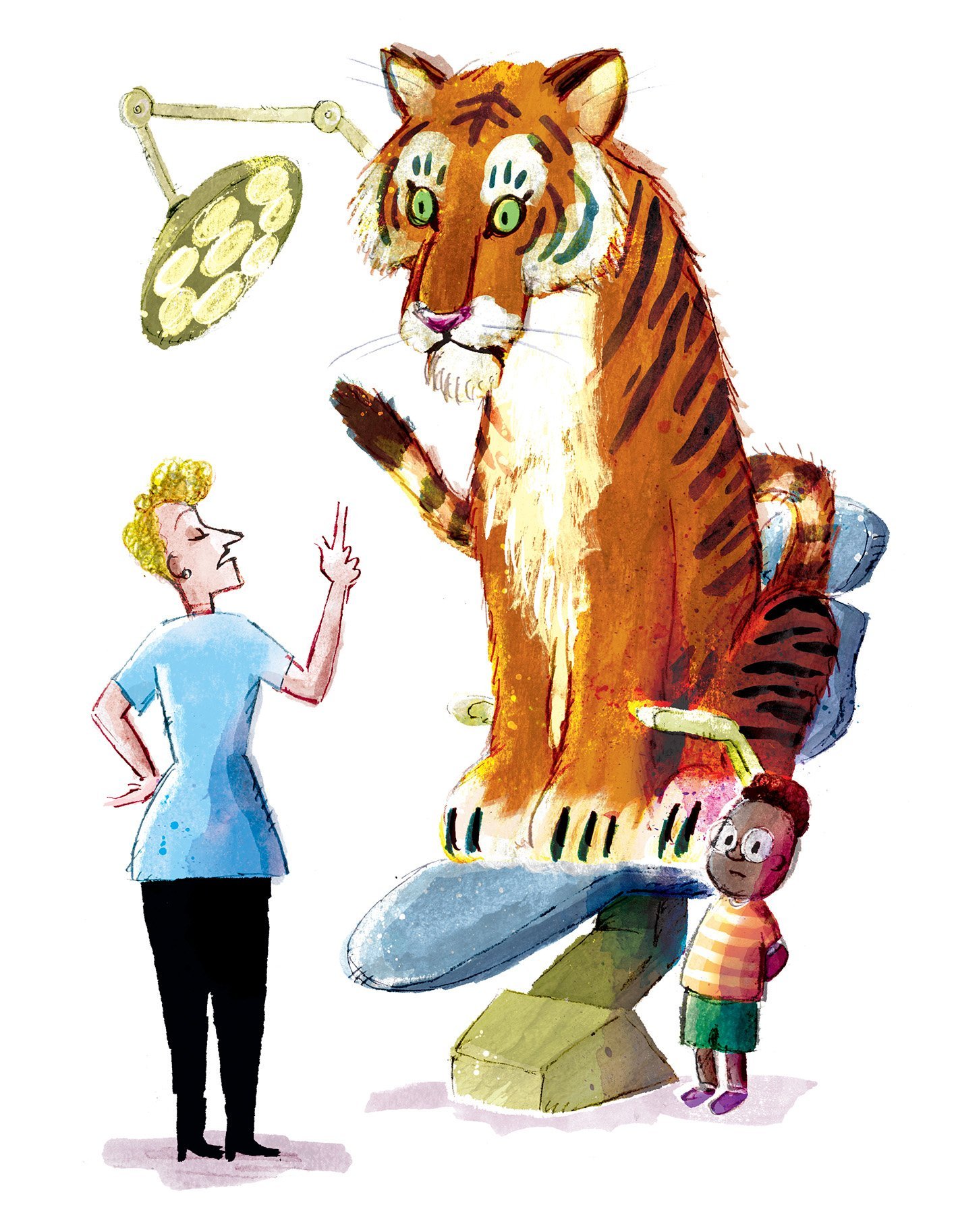
My Tiger is probably her favourite, she says when pressed.
A short story with a twist in its tail, about a tiger at the dentist, it conjures memories of "a foot drill that ground through your teeth" and "a grumpy nurse who didn’t like you wriggling or crying".
"I think every school in New Zealand had a dental clinic ... and the children all called them the same thing — the murder house."
In this story, it is the tiger who does the damage.
"I did feel a little apologetic to dental nurses. But it didn’t stop me writing it."
Twists and turns seem to mark Dame Joy’s life.
She has been married three times; the second to Malcolm Mason, an accountant and writer — "a lot older than me ... a very good man" — who died in 1985; and the third to Terry Coles, a former Catholic priest, whom she lived with in the Marlborough Sounds, Wellington and then Featherston, where he died two years ago.
But it was the end of her first marriage that produced a dark crisis that ultimately led to a new vision for life.
It is not something she has previously spoken about to news media.
"I had a near-death experience ... which changed my life.
"It was in the late 1960s, and it was when my first marriage broke up.
"He didn’t want to marry me, but I was pregnant with his child and his mother made him do that.
"So I had an agreement with him that he could still go out with other girls. We were both young."
The Cowleys had four children, whom she describes as "wonderful".
Then her husband fell in love with another woman. He wanted to marry her and take the children with him.
She sought legal advice and was told the likely outcome would be the two boys going with their father and the two girls staying with her.
She was devastated by the prospect.
"I couldn’t do it. I managed for a while, but I wasn’t sleeping.
"I wasn’t sleeping and I got a [sleeping pill] prescription.
"Now, I had done pharmacy ... So I knew that seven of these tablets could kill somebody. And I took 11 ... I wasn’t thinking very clearly."
She then had an out-of-body experience.
"There I was flying, into a light, which cannot be described as we describe the sun or electric lights or anything like that.
"It was also presence. It was love ... It was something I had known always. And I was going into it; I was going home."
Then she sensed herself "falling back".
"I could feel the weight of my body ... and there were voices around me. I was in hospital."
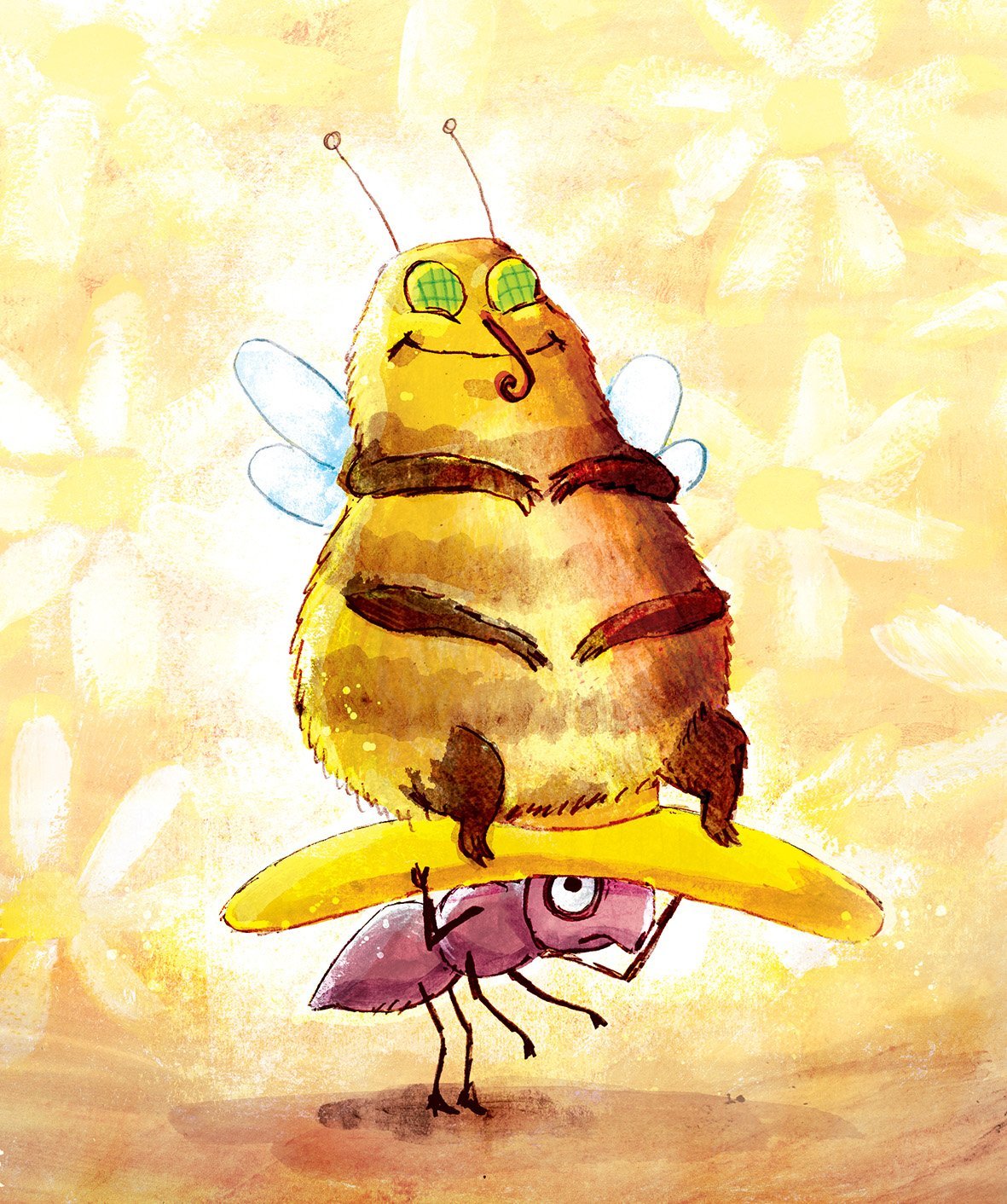
Her actions left her, for a time, blind and paralysed. But what she had experienced catalysed a spiritual search.
"I started looking at all the allusions to light; first of all in the New Testament, in the Bible — Jesus described himself as the light of the world — and then talking to people who had had near-death experiences.
"From a moment which was the worst time of my life, it became suddenly the most beautiful."
The experience also left her fearless. She has bungy-jumped, scuba-dived and flown planes.
"I’ve done a lot of things that a timid young woman wouldn’t have done."
Like moving to a new city in her late 80s with advanced macular degeneration that only allows her to recognise faces when they are almost close enough to kiss.
Not that Dunedin is entirely foreign; she visited regularly through the years, particularly to speak in schools.
On one trip, in the early 1980s, she had with her the draft of a novel a group of women, keen to see it published, had given her to evaluate. The Dunedin visit was busy, so it was not until she was travelling north again by train that she read the manuscript.
"It was amazing. It needed a little editing, but it was an extraordinary book."
She helped get it published locally and got a copy to an Auckland publisher with links to England.
"The man didn’t think much of it, but his wife was captured by it.
"It won the Booker Prize, and that was The Bone People [by Keri Hulme] ... It still is my favourite New Zealand book."
She also used to come south because Dunedin priest Fr Mark Chamberlain was her spiritual director and, as a spiritual director herself, to lead retreats.
"Officially, I’ve been doing that for about 10 years, but it was happening before that."
Her faith shares characteristics with the Catholic Church, which she joined after a three-month trip around South America.
"I’d been learning Spanish. And I’d go and just go and sit in these beautiful churches ... and there’d be a puddle on the floor ... and there’d be an empty beer can somewhere else on the floor ... And somehow that made sense to me.
"That’s me, deeply spiritual and messy."
Macular degeneration has been progressively robbing Dame Joy of sight for the past decade. But she has found ways to adapt, to still allow her to write. She is already thinking about the next book — a fun children’s tale with a lesson about name-calling — and the book after that.
Tomorrow, however, A Lot of Silly will be launched in Dunedin, from 4.30pm, at Dame Joy’s retirement village, Summerset at Bishopscourt; a public event for children and parents, with, of course, cake and a book reading.
More than halfway through A Lot of Silly is a four-line poem, Sea Cat. It is about a moggy who dives deep. She gets her whiskers wet, but is rewarded with fish for tea.
"We all get crucified and then resurrected, unless we get stuck in the tomb of self-pity and blaming.
"We’ve got to understand that every gift we’re given has a shadow. Sometimes we see the shadow and don’t see the gift ... but we also need to understand that the shadow is the area of growth."
Life is a birthing process, she says with a smile.
"I have long since accepted that at this time of life, this is when the body goes into labour to give birth to the soul. So losing sight is the first indication of going into labour. And that’s a positive for me."
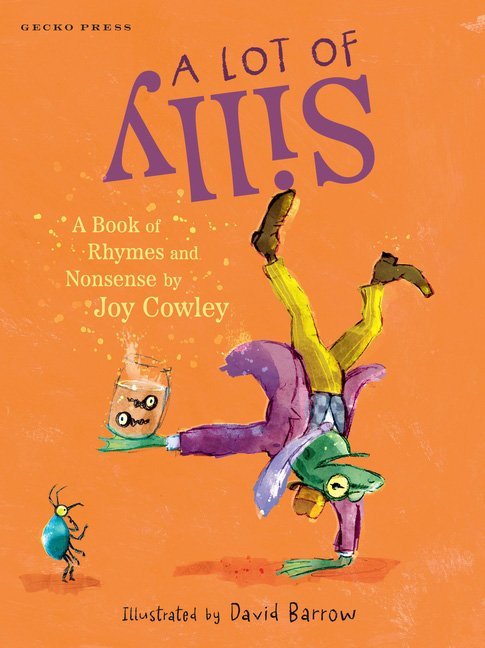 The book
The book

• A Lot of Silly: A Book of Rhymes and Nonsense by Joy Cowley, illustrated by David Barrow, 2024, published by Gecko Press, RRP $34.99.
Help available
• Need to talk? 1737, free 24/7 phone and text number
• Healthline: 0800 611-116
• Lifeline Aotearoa: 0800 543-354
• Suicide Crisis Helpline: 0508 828-865 (0508 TAUTOKO)
• Samaritans: 0800 726-666
• The Depression Helpline: 0800 111-757










